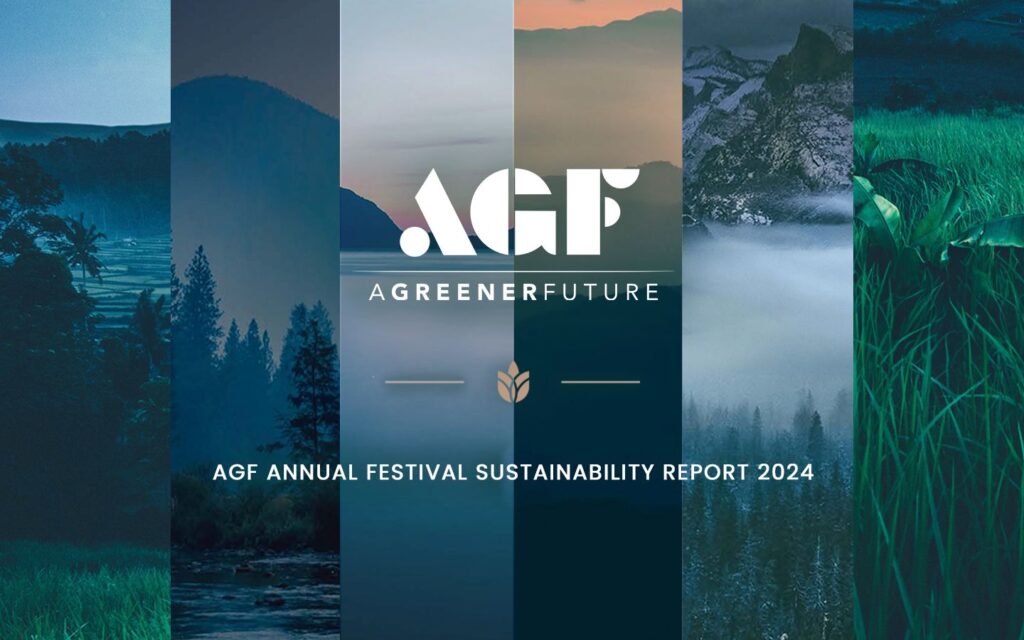AGF (A Greener Future) has today released its latest ‘Festival Sustainability Report’ for European festivals, providing industry wide benchmarks for the festival sector.
The 2024 report is a culmination of a year of information gathering, data analysis and number crunching for the 40+ festivals from all over Europe assessed by AGF in 2023, with sections on mobility, food & drink, water & sanitation, power & fuel use, waste & recycling, and carbon emissions.
There have been some significant areas of improvement, such as bans on single use plastic serve ware increasing from 54% in 2022 to 75% in 2023, a reduction in average waste per person per day from 0.75 kg to 0.5 kg, and more festivals going fully vegan or vegetarian.
AGF were also able to expand on their carbon footprint breakdowns for festivals, and compare emissions by type of festival. The results further highlighted the significant impact of travel and transport, and that food and drink are often the second largest source of emissions after audience transport. Crucially, festivals who moved to a fully meat-free event reduced their food-related emissions by over 60% on average.
Water use increased at both urban and rural camping festivals, significantly at the latter, with an average of 26 ltrs pppd, up from 19 ltrs pppd in 2022. The increase could be due to various factors, however, it does align with the hottest summer on record recorded in summer 2023. Changes to the environment in which outdoor events are operating points to the broader need for the sector to prepare for climate adaptation in addition to climate change and pollution prevention.
The collection of accurate data on build, decor, staging and merchandise materials purchased remains a challenge, as well as engaging with Sponsors and Hospitality areas to provide the necessary information and to assess their impact. AGF are working closely with clients and the sector to bridge these gaps.
In addition, while an increasing number of festivals are switching to renewable fuels such as HVO, it is important to highlight that, although considered renewable, these fuels still generate emissions and air pollution. Reducing overall fuel use and improving the availability and affordability of hybrid, battery, and grid systems remains a key opportunity to decarbonise the sector.
This year’s findings highlight the evolving trends and the significant steps forward demonstrated by festivals and their suppliers across Europe and beyond.
Key Findings from the 2024 Report:
Travel & Transport
- 68% domestic artists on line ups on average (from 61% in 2022).
- Reduction in the average share of attendees reporting travelling by car to rural festivals from 67% to 58%, with an increase in reported plane travel.
- The average share of attendees using public transport to attend rural festivals increased from 16% to 19%.
Food & Beverage
- 75% banned single-use plastic serve ware (increasing from 54% in 2022).
- 60% had a reusable cup system.
- 55% had a formal sustainable food and drink policy.
- Red meat dishes accounted on average for more than half of a festival’s food emissions.
Water & Sanitation
- 2% used compost toilets for over 3/4 of their sanitation demand.
- 75% of festivals still use some portable chemical toilets onsite.
Power & Fuel Use
- 38% used HVO Fuel for 100% of generators.
- 15% of festivals used grid electricity for over 90% of their power needs.
- Encouragingly, events are increasingly introducing hybrid, renewables, and battery storage systems to reduce fuel use.
Waste & Recycling
- 0.5 kg average waste per person per day (reduced from 0.75kg).
- Onsite recycling separation rates increased from 38% (2022) to 46% (2023).
Carbon Emissions
- Audience travel and food & beverage are frequently the largest emissions sources, closely followed by production transport and artist transport.
- Removing meat resulted in an average reduction in food-related emissions of over 60%.
Claire O’Neill, AGF CEO Says:
“2024 is the 18th year that AGF is assessing festival impacts worldwide. It’s good to see improved understanding, data, and performance from events. We are seeing progress, but more still needs to be done to now additionally adapt to changing and more extreme weather. There is a huge opportunity for collaboration with other sectors such as transport, energy, water and food who all have targets for net zero and protecting ecosystems. New ways of doing things need dynamic and attractive platforms to reach people, which is what festivals are. While progress is good, the background is changing, adversely – We’re on a path to net zero but the path just got steeper, so we need to keep upping our game.”
Download the full report here.
AGF Annual Festival Sustainability Report 2023
AGF Annual Report Stats April 2024




